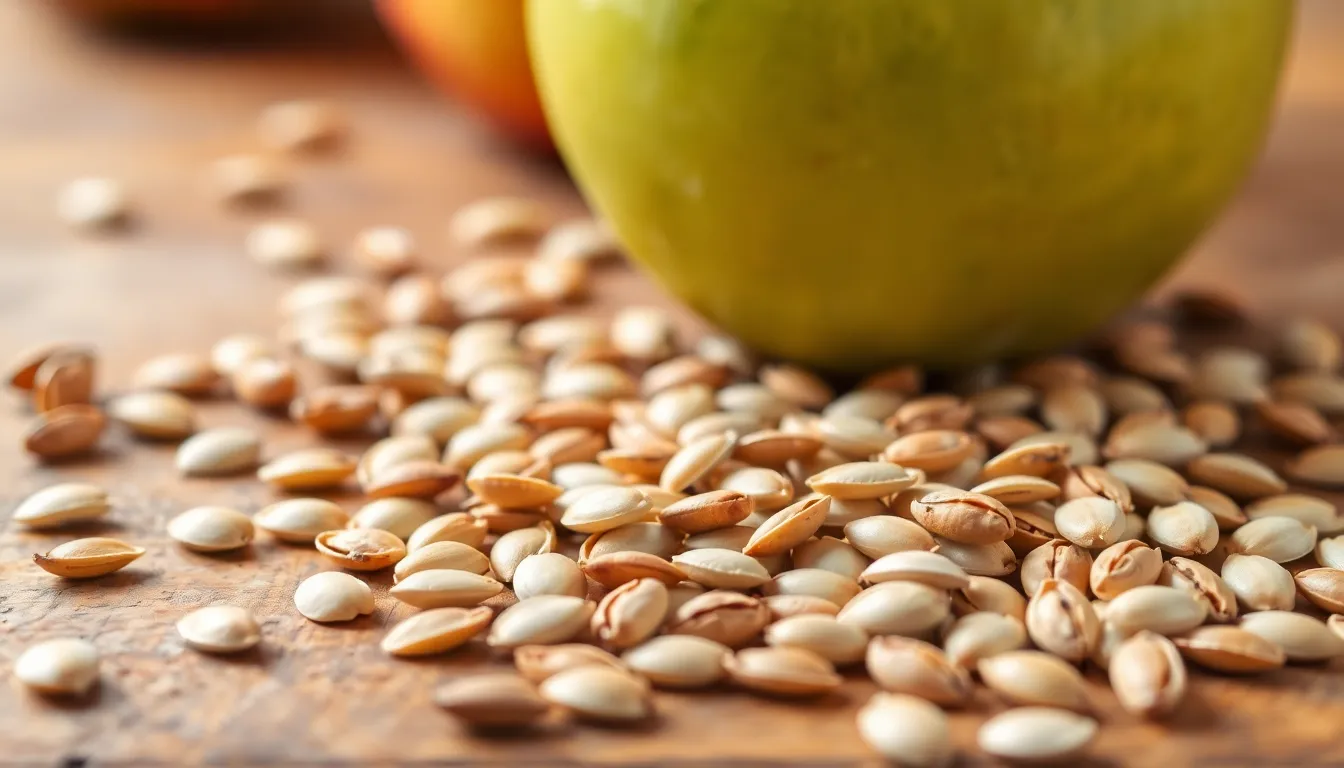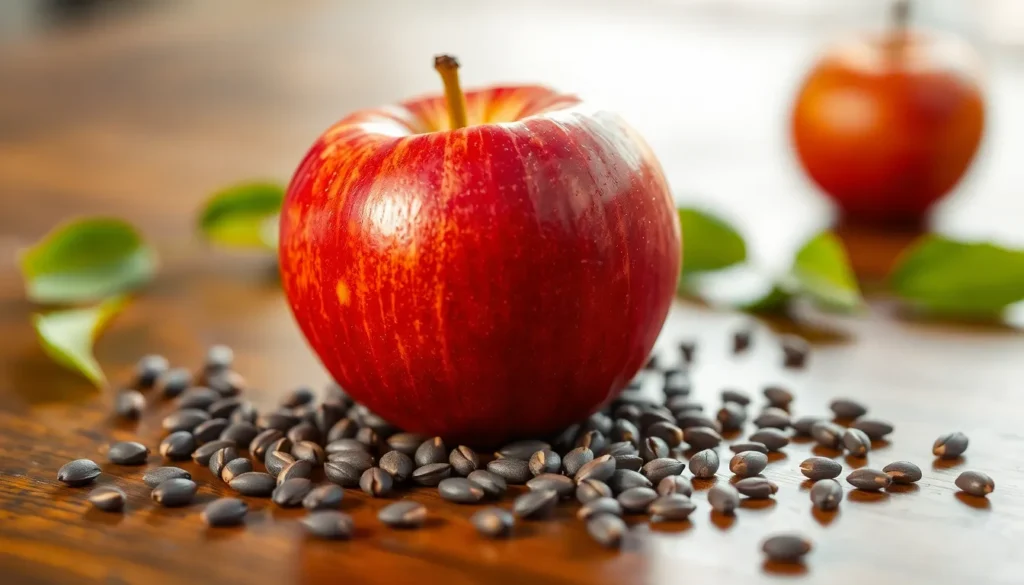Table of Contents
ToggleWhen biting into a crisp, juicy apple, most people savor the sweet taste and refreshing crunch. But what if that delightful snack harbors a hidden danger? Apple seeds, the tiny little nuggets within the fruit, have sparked debates about their safety. Some folks wonder if these seeds contain arsenic, the notorious poison that’s often the villain in movies.
While the idea of arsenic-laden apple seeds might sound like a plot twist from a thriller, the truth is a bit more nuanced. Sure, apple seeds do contain a compound called amygdalin, which can release cyanide when metabolized. But before you start a seed-spitting contest or throw away your favorite fruit, it’s important to understand the facts. Let’s dig into the science behind apple seeds and uncover whether they’re a health hazard or just a harmless part of your snack.
Understanding Apple Seeds
Apple seeds contain unique compounds that generate interest among health enthusiasts. They hold both nutritional value and potential risks worth exploring.
Nutritional Composition
Apple seeds provide a small amount of nutrients, including fiber and healthy fats. These seeds possess vitamin B17, also known as amygdalin, which is often debated in terms of health benefits. It’s important to note that the quantity found in seeds is minimal. They don’t offer significant protein or vitamin content compared to the fruit itself. Consuming a few seeds accidentally poses no real threat, due to the low levels of toxic compounds present.
The Myth of Arsenic in Apple Seeds
Concerns about arsenic in apple seeds often stem from misconceptions. Arsenic is not naturally found in apple seeds; rather, the misleading information arises from confusion with cyanogenic compounds. Amygdalin, when ingested in significant amounts, can release cyanide, which is much more relevant to health discussions. Studies show that consuming a handful of seeds infrequently does not pose a serious health risk. Most people consume apple seeds without any adverse effects, further debunking the myth surrounding their danger.
The Science Behind Arsenic

Arsenic often raises health concerns, particularly regarding its presence in various foods. Understanding arsenic and its relationship with apple seeds provides clarity about potential risks.
What Is Arsenic?
Arsenic is a naturally occurring element found in soil and water. It’s commonly classified into two forms: organic and inorganic. Inorganic arsenic poses a greater health risk and is often linked to serious health issues. Exposure to high levels can lead to toxicity, affecting multiple organ systems. Recognizing sources of arsenic in foods is crucial for informed dietary choices.
Natural Sources of Arsenic in Foods
Various foods naturally contain arsenic, primarily rice and certain seafood. Rice absorbs arsenic from soil and water more than other crops. Seafood may contain organic arsenic, which is generally less harmful. Additionally, root vegetables can absorb this element from soils, contributing to dietary exposure. Awareness of arsenic in food helps consumers make safer choices while consuming a balanced diet.
Do Apple Seeds Contain Arsenic?
Concerns about apple seeds often stem from misconceptions surrounding their contents. While some may fear arsenic, it is important to clarify the facts.
Examining the Research
Research shows that apple seeds do not contain significant levels of arsenic. Studies indicate that apple seeds primarily have amygdalin, which can release cyanide, not arsenic. A few seeds consumed occasionally won’t result in health risks. According to the Toxicology Data Network, cyanide levels in small quantities of seeds are not harmful. Investigations emphasize that the real concern lies with amygdalin rather than arsenic’s presence in apple seeds. Thus, understanding the science behind these seeds is vital for accurate information.
The Role of Amygdalin
Amygdalin is the key compound found in apple seeds. When metabolized, it can produce cyanide, which raises safety questions. Small amounts of this compound occur naturally and pose minimal risk when consumed infrequently. Experts highlight that the body metabolizes amygdalin poorly, preventing significant cyanide production. Ingesting a few seeds does not typically lead to toxicity. Nutritionists recommend avoiding excessive consumption to stay safe. As such, knowledge about amygdalin’s effects contributes to a clearer understanding of apple seed safety.
Risks Associated with Apple Seeds
Apple seeds pose certain risks, mainly attributed to the compound amygdalin. This compound can convert into cyanide under specific conditions. Understanding the toxicity levels and safe consumption guidelines is essential for making informed choices.
Toxicity Levels
Toxicity levels in apple seeds depend on several factors, including the amount consumed and individual health factors. Acute cyanide poisoning can occur when someone ingests high quantities of seeds, typically thousands, as the body requires significant amounts of amygdalin to produce a harmful effect. A few seeds, on the other hand, do not generate enough cyanide to be dangerous. Research shows that an average adult would need to consume at least 200 seeds in one sitting to face severe toxicity levels. It’s important to recognize that occasional consumption of small amounts presents minimal risk.
Safe Consumption Guidelines
Experts recommend moderation when it comes to eating apple seeds. Consuming one to two seeds sporadically poses little health risk. The body metabolizes cyanide poorly, limiting any potential harmful effects. For those concerned about amygdalin, removing seeds from apples before consumption is a straightforward approach. Rather than focusing on complete avoidance, individuals can enjoy apples while being cautious with seeds. Education about safe consumption helps reinforce confidence in dietary choices related to apple seeds.
Understanding the safety of apple seeds is crucial for making informed dietary choices. While they contain amygdalin which can release cyanide under certain conditions, the actual risk from consuming a few seeds is minimal. Research shows that it would take a significant quantity of seeds to pose any real threat to health.
For those who enjoy apples, removing the seeds before consumption is a simple precaution. By staying informed about the science behind apple seeds and their compounds, individuals can confidently incorporate apples into their diet without unnecessary worry.







